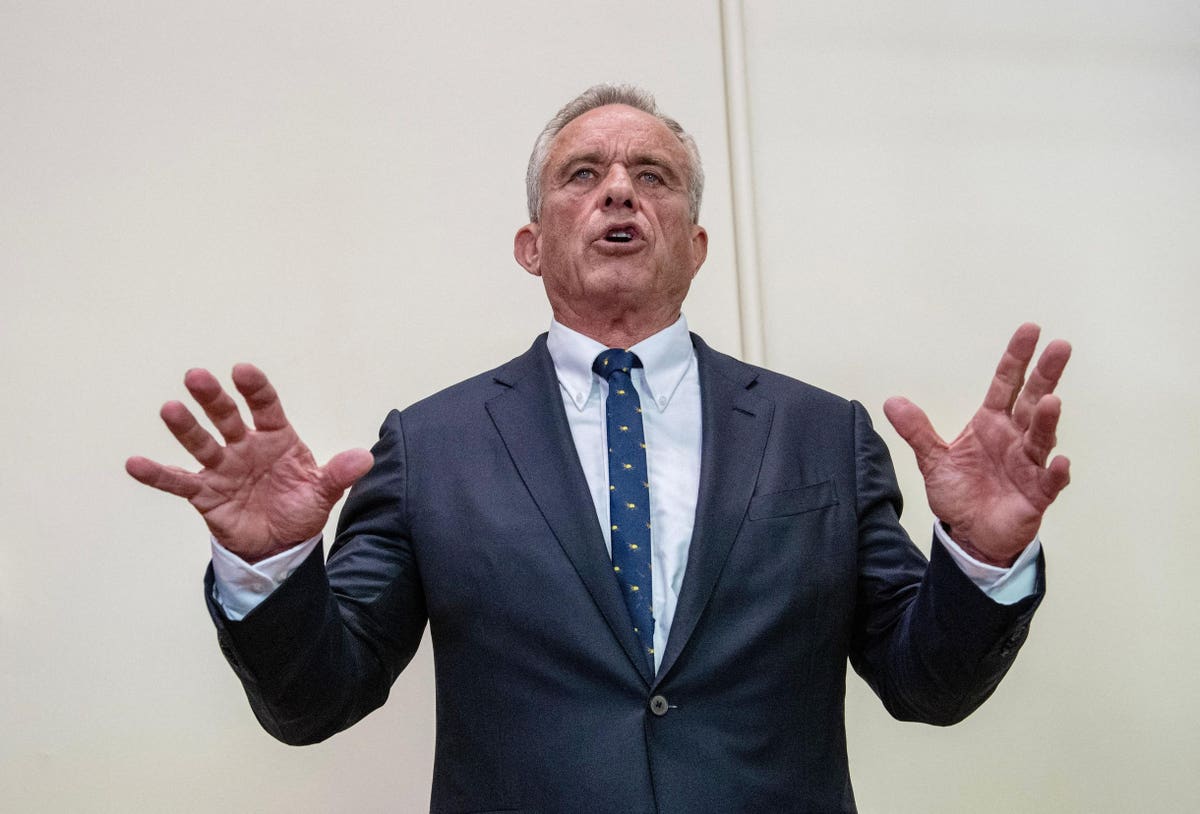When you put the weight of your reputation behind a claim, you’d better make sure what you say is actually accurate. Recently, Robert F. Kennedy, Jr. tweet-claimed that “Americans gained an average of 29 pounds during the Covid lockdowns.” Since Kennedy is running for U.S. President and has appeared on Joe Rogan’s and Bill Maher’s podcasts, whatever Kennedy says will likely be noticed widely. But Kennedy—weight for it, weight for it—didn’t provide any source to support his 29-pound claim. Late night talk show host Jimmy Kimmel weighed in with his thoughts about the claim, tweet-responding, “wow! we each gained 29 lbs? that almost sounds like nonsense! (there’s a good possibility this guy is Borat).” That wasn’t exactly a “High five” to what RFK Jr. had claimed.
Well, some tweet-readers tried to pound out where RFK Jr. may have gotten his average number. And you can see what they came up with in the Twitter context statement that got attached to Kennedy’s tweet:
Yes, they were able to find a 29-pound number among results from the American Psychological Association’s Stress in America survey of 3,013 adults residing in the U.S. The Harris Poll had conducted this survey from February 19 through February 24, 2021. But this 29-pound number was pound-for-pound not the same as Kennedy’s claim. This survey did find that 42% of those surveyed had self-reported undesired weight gains since the start of the Covid-19 pandemic and that among these folks specifically, the average self-reported weight gain was 29 pounds. That’s very, very different, though, from saying that the average American had gained 29 pounds. In fact, the survey also found that 18% of respondents had self-reported the exact opposite—an undesired amount of weight loss—during that same time period. Among these folks the average self-reported weight loss was 26 pounds.
Now, you may have noticed a lot of self-reportsies in the paragraph above. It’s important to stress that those who conducted this Stress In America survey did not confirm any of these self-reported numbers with actual measurements via scales. And anyone who believes that people always describe themselves accurately hasn’t been on Tinder or Match.com lately.
Another issue with Kennedy’s tweet was his use of the term “Covid lockdowns.” This term has been thrown around and used in all sorts of ways throughout the pandemic to the point that it’s lost its original meaning, sort of like how the word “professional” is overused on LinkedIn. The survey asked about weight loss or gain throughout the first year of the Covid-19 pandemic and not specifically when more restrictive policies were in place. If you recall, there was about a three-week period from from March 19, 2020, through April 6, 2020, when 45 out of 50 state governments had issued shelter-in-place (SIP) orders, as described by a publication in JAMA Network Open. This was done because political leaders in the U.S. were caught with their collective pants down in 2020 and wanted to slow the spread of the severe acute respiratory syndrome coronavirus 2 (SARS-CoV-2) to buy time to decide what to do and implement plans. Such SIP orders were not in place for much of 2020. So if someone did report gaining weight on the survey, it’s not clear how much of that weight gain was attributable to Covid-19 policies versus the general stress and conditions during the pandemic and the surrounding political and economic environment. Add to that the fact that American has been in the midst of an obesity epidemic since the 1980s that has never been fully addressed.
An additional concern is that Kennedy’s tweet may oversimplify how our society should address any weight gain that may have occurred. When he tweeted “encouraging our citizens to exercise,” did he mean that he would don some tights and run a Pilates class for the whole nation each morning? The past several decades have shown that simply telling people to exercise more and eat well has done little to stem the obesity epidemic. It’s not as if people will say, “Oh, thanks for telling us that. We thought that we are supposed to eat badly and not exercise.” Instead, a number of scientific publications have already pushed for more systems approaches and changes to address obesity and the obesity epidemic. This has included a report from the National Academies of Science, Engineering, and Medicine and publications in scientific journals such as Nutrition Reviews and the American Journal of Public Health. Systems approaches means not simply focusing on or blaming the individual but aiming more to address the various broken systems around people that may be contributing to obesity such as reducing the amount of sugar, salt, and artificial ingredients in food that is being sold, improving access to more healthful foods, increasing the walkability of towns and cities, bolstering public transit, finding ways to reduce stress across society, reducing pollution, and addressing racism and other causes of worsening socio-economic disparities.
As of July 10, Kennedy’s post has remained on Twitter without RFK Jr. himself adding any further clarification as to where he got the 29 pound number. During his appearance on Maher’s podcast Club Random last month, Kennedy asserted that he believes in science, as I covered for Forbes. But a big part of science is making sure that you provide clear, legitimate scientific sources whenever you widely disseminate a number such as 29 pounds. Otherwise, people can just pull number out of their you-know-wheres to support whatever they want to push. Imagine being told by someone, “97% of Americans think that you suck.” Would you believe that person? Would you simply accept that number without insisting on the source? Or would you want real science to weigh in on the matter?
Read the full article here





